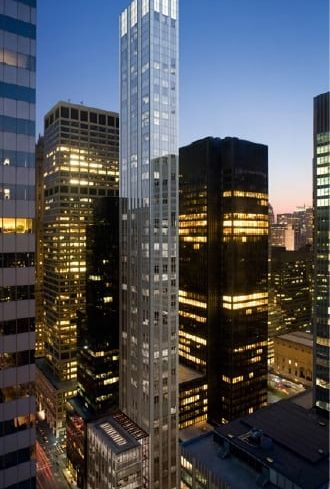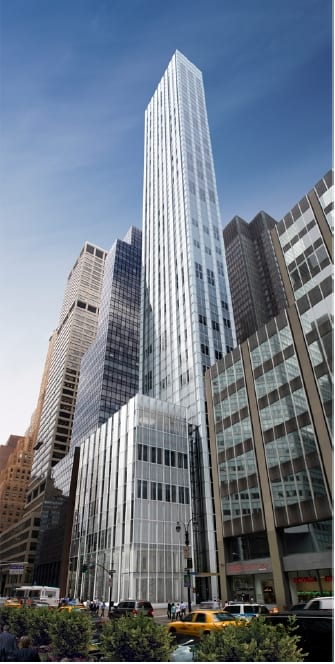Vanke Files Lawsuit to Remove RFR From Midtown Condo Development Partnership
By Mack Burke and Cathy Cunningham November 24, 2020 12:04 pm
reprints
A legal dispute between partners RFR Holding and Vanke US over their luxury residential condominium development at 100 East 53rd Street in Midtown is intensifying.
In response to a lawsuit filed by Aby Rosen’s RFR in late October — which accused Vanke of orchestrating “an irreconcilable and grossly improper conflict of interest” when its affiliate purchased a $115 million participation interest in the property’s construction debt and became a controlling party in the loan — Vanke has now filed a countersuit that seeks to remove RFR as the partnership’s managing member entirely.
The lawsuit accuses RFR of engaging “in a pattern of behavior designed to harm the company with a goal of obtaining a buy-out of its own interest at an exorbitant rate.”
The response was filed late yesterday in New York County Supreme Court. RFR officials declined to comment.
RFR and Vanke purchased land at the site, also known as 610 Lexington Avenue, in 2014 with plans to construct and sell luxury condo units, along with retail and restaurant space at the base. Rosen had tapped famed architectural and engineering firm Foster + Partners, French architect and interior designer Joseph Dirand, and Michelin-starred chef Alain Verzeroli to see out his vision of the project.
RFR had brought Vanke US — a U.S.-based subsidiary of Vanke and one of the largest residential developers in China — into the project as its financial partner, with RFR tasked with the day-to-day construction and sales process. RFR co-developed the asset with Hines, as per information from CoStar Group and details on Hines’ website.
Today, Vanke has a 93 percent stake and RFR a seven percent stake in the ownership company, named 610 Lexington Development LLC (“the company” in the lawsuits).
The partnership secured a $360 million construction loan from a group of lenders led by Industrial and Commercial Bank of China (ICBC) in 2015 that would mature on May 1, 2020. The property, which first launched sales in 2016 and finally finished up the last touches of construction in 2019, had been struggling to find its footing in a tough, Midtown luxury condo sales market leading up to when COVID hit.
Vanke’s countersuit claims that, as the loan’s maturity date loomed, Rosen’s proposed strategy to address the impending maturity default included an attempt “to create a bleak outlook for the property” in the hopes that ICBC would offer a large discount on the loan, and that Rosen “made clear that he would insist that RFR receive (if successful) a disproportionate portion of the value of any such distressed refinancing. Such a strategy was commercially unreasonable and saddled Vanke, as the 93 percent owner of the company, with almost all of the downside risk.”
The lawsuit alleges that “Rosen made clear that if Vanke did not agree to this strategy, RFR would force Vanke to buy out RFR at a value far exceeding its economic interest in the company.” When Vanke refused to accept these terms, RFR tried to force a buyout of their position “by simply refusing to act in a commercially reasonable manner in managing the company’s business and addressing the maturity default of the ICBC loan,” the lawsuit states.

With regard to the loan maturity, Vanke claims that RFR made a “low-ball offer to ICBC for a loan modification, which it rejected,” at which point RFR stopped negotiating with ICBC altogether. Sources familiar with the negotiations said that this offer comprised a request for principal forgiveness and also an interest rate slash.
ICBC officials did not respond to a request for comment.
When Vanke tried to understand RFR’s negotiation strategy, with ICBC, “RFR explained that it intended to use the COVID-19 pandemic as cover in order to delay, by forcing ICBC to sue for foreclosure…they claimed the strategy was simply to delay ICBC in the hope that they would lose patience with the litigation process and negotiate a better deal,” the countersuit states.
At this point, having exhausted efforts to get RFR and ICBC talking again, Vanke continued the ICBC discussions without RFR — the crux of RFR’s initial lawsuit, which claimed that Vanke and ICBC engaged in a “back door deal” in an attempted “power grab.”
RFR’s suit claimed it had the exclusive right to discuss the loan with ICBC, but Vanke’s countersuit claims the parties’ agreement “affords no such right.” Vanke’s filing also states that RFR had requested that Vanke use its banking relationship with ICBC to bring it in as construction lender for the property.
RFR’s lawsuit claims that, in August 2020, Vanke “pulled the rug out from under RFR,” when it disclosed that its affiliate, PTB, had executed a participation agreement with ICBC to acquire a $115 million participation interest in the loan without RFR’s involvement or consent, thereby making PTB a controlling party over the remaining noteholders with the right to control enforcement of the loan. “Its interests had become directly adverse and hostile to those of RFR and the company and rendered impossible any further attempt by RFR to negotiate a legitimate, arms-length workout of the terms of the Loan with [ICBC],” RFR’s lawsuit states.
Rosen’s initial lawsuit alleged that Vanke US had become a “mole for the lenders” when it discovered in August that Vanke’s affiliate had moved to purchase the $115 million debt position without its “involvement or consent.” RFR’s lawsuit called the deal an “unauthorized transaction” that gave Vanke the power to assume control over loan enforcement actions, loan modifications or workouts, and even foreclose on the property.
RFR’s suit accused Vanke and ICBC of “conspiring together to the detriment of RFR” and said this “fait accompli” was revealed when the participation documents showed that ICBC had bought out the other lenders in the loan.
But from Vanke’s perspective, the move was an effort to rescue the ownership company. “There is nothing in the parties’ contract that prohibits such an agreement,” and “in no way has RFR been injured by this agreement,” its lawsuit claims. The firm also offered RFR the chance to participate in the debt investment, its new lawsuit claims.
In late March, as the May 1 maturity date for the loan closed in — and months prior to Vanke acquiring its debt position — Vanke offered to pay $75 million to buy 25 of the “least expensive (and hence most saleable)” condo residences in an effort to help handle loan payments and obtain a potential one-year loan extension from ICBC. RFR ultimately blocked that offer, according to RFR’s lawsuit, in “violation of of its agreement with Vanke,” as per Vanke’s response.
Vanke wrote in its suit that the goal of the purchase was to inject capital into the partnership to better position RFR to negotiate a loan modification with ICBC. The purchase, which Vanke said in its suit would’ve been “considerably above the then-prevailing market price”, would’ve doubled the number of residences that had already been sold by that time in late March.
“In reality, [Vanke’s] proposed transaction would have benefited only Vanke and [ICBC] at the expense of RFR,” as per RFR’s lawsuit. “Specifically, the transaction would have enabled Vanke to seek to flip the more marketable units at a significant profit for itself, while giving [ICBC] an additional year’s worth of interest and de-levering the loan.” RFR deemed Vanke’s proposal “unacceptable” on the grounds that it would make it “virtually impossible for the [ownership group] to repay the loan in that it would have saddled [it] with the most expensive and least saleable units.”
A deal wasn’t struck and the partnership eventually defaulted on the construction loan that May, while the pandemic’s effect on the economy was in full swing.
Vanke’s offer came not long after RFR failed to reach its preferred agreement with ICBC on a loan modification. RFR wrote in its lawsuit that, given that there was a moratorium on mortgage foreclosures and because the New York state court system was essentially closed to such actions at the time due to COVID, that ICBC would’ve been “incentivized” to cooperate with RFR in “a workout of the loan on more realistic terms.”
When RFR was unable to modify the loan, it accused Vanke of trying to take advantage of the partnership’s “distressed conditions—and its own access to insider information about RFR’s plans for the building—to put its own financial interests first, seeking to secretly strike an independent deal with [ICBC],” which it said in its lawsuit caused “great damage to RFR.”
Vanke’s countersuit details numerous instances where the partnership soured over the past year, ahead of any distress caused by the pandemic. One such instance was when additional capital was needed to cover necessary expenses, cost overruns, and real estate taxes in December last year. “Vanke funded its share of the additional capital needed, but RFR refused to fund its share,” the lawsuit alleges.
It also alleges RFR had breached the LLC agreement in 2019 by “inappropriately signing a restaurant lease [with Le Jardinier] over Vanke’s objection that committed in excess of $15 million more than budgeted for developing the commercial space,” and that RFR “mismanaged the sales process for the condominium units by insisting on sales prices that were too high.”
Vanke claims that RFR ratcheted up its efforts to force a buyout by “neglecting its role as managing member.” The lawsuit gives the example of an offer for the purchase of unit 26A that Classic Realty, an RFR affiliate, had received. The offer was $100,000 under the minimum release price. While Vanke accepted the offer on Classic Realty’s recommendation, RFR refused to accept it. The countersuit claims that Ross Fleming, who leads residential development for RFR, “made clear that its decision was based on its cynical efforts to force a buyout, stating that until there is ‘clarity’ with respect to the ‘current relationship between Vanke and ICBC’ RFR would not even discuss approving the offer on 26A,” and that RFR has since indicated that it will refuse to approve any sales on a going-forward basis.
While RFR is seeking damages, as well as an injunction to stop Vanke from “carrying out its self-serving scheme and destructive plan to abuse its position as a member of the company to reap a profit,” through its wrongful acquisition of a participation interest in the loan. For its part, Vanke is seeking the removal of RFR as managing member and all costs and attorneys fees incurred in its filing.



